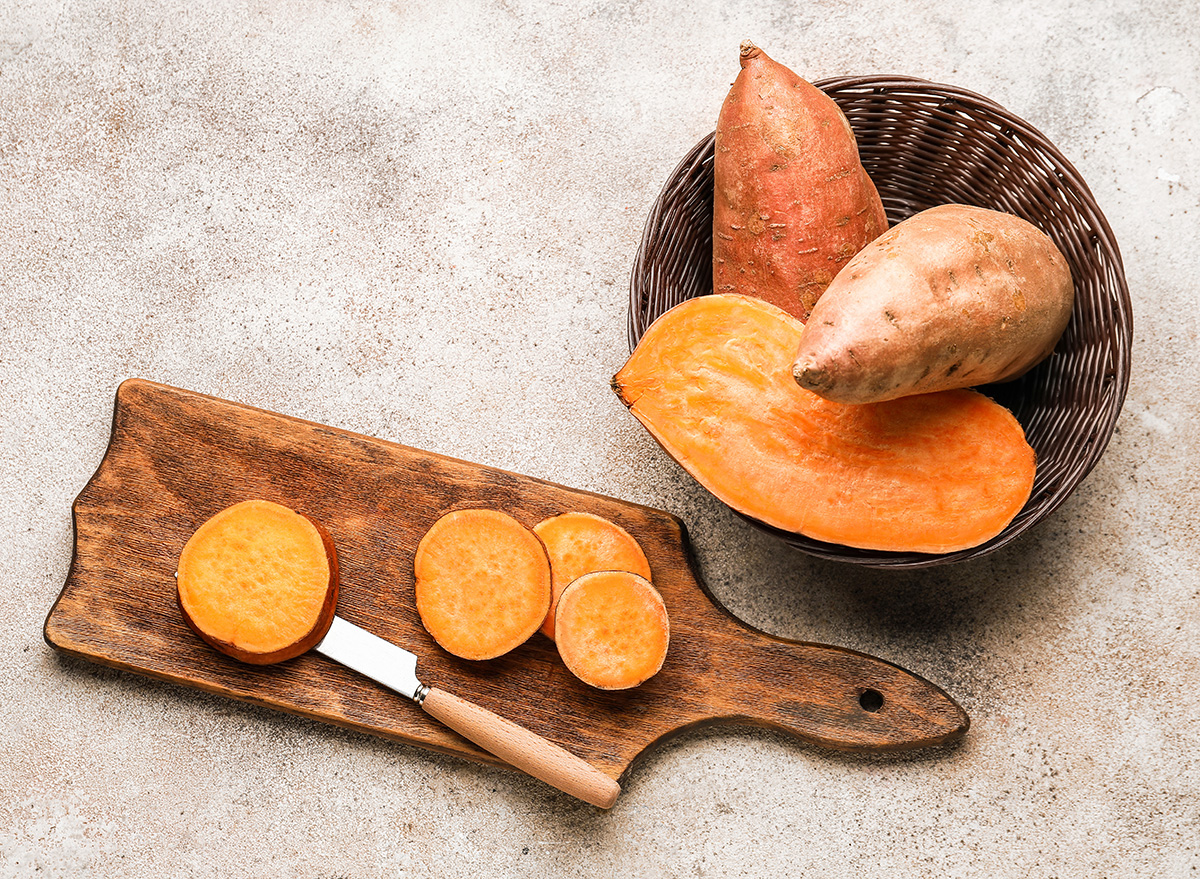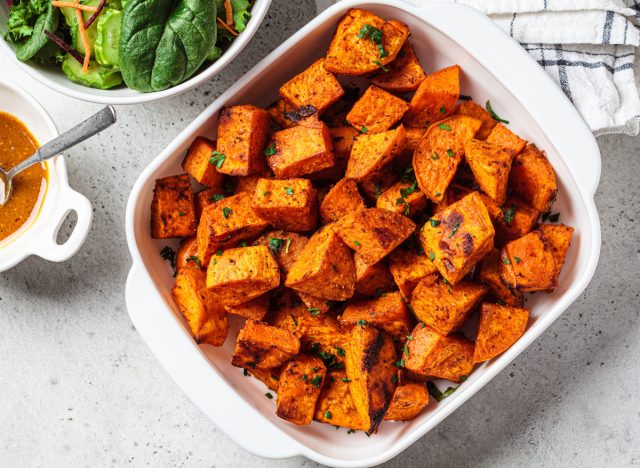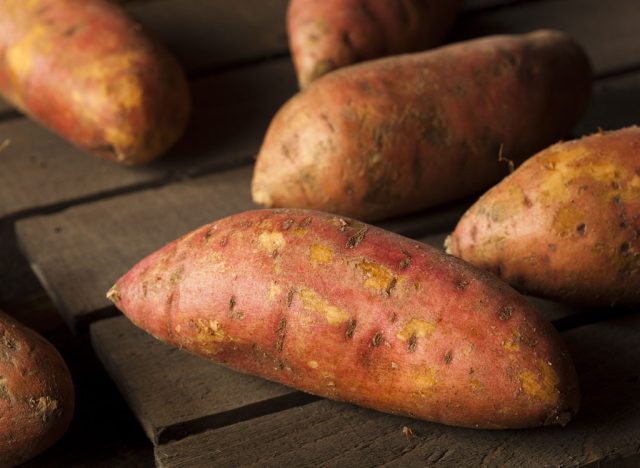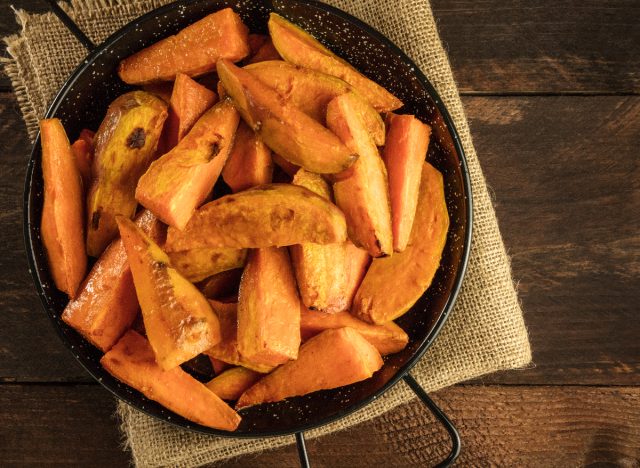Are Sweet Potatoes Healthy? 6 Benefits To Know

The darling of the healthy carb world, sweet potatoes get an automatic green light from dietitians thanks to their stellar nutritional content. Sweet potatoes are rife with important nutrients like fiber, vitamin A, and potassium. And they can help you maintain whole-body health (so long as you're not always eating them topped with melted marshmallows).
Despite their impressive nutritional profile, certain groups of people should avoid eating them regularly. Here, we explore sweet potatoes' benefits and side effects and how to include them in a balanced diet. Read on, and for more, check out The Verdict On Whether White or Sweet Potatoes Are Healthier.
Sweet Potato Nutrition

Calories: 180
Fat: 0 g (Saturated fat: 0 g)
Sodium: 72 mg
Carbs: 41 g (Fiber: 7 g, Sugar: 13 g)
Protein: 4 g
The Benefits of Sweet Potatoes

They're Great for Heart Health
Sweet potatoes are an excellent source of fiber and potassium, arguably two of the most important nutrients for heart health. One cup of baked sweet potatoes gives you about 24% of your daily value of fiber and 20% of your daily value of potassium.
Fiber helps heart health by preventing fats from being absorbed into your bloodstream, therefore helping lower your LDL, or "bad" cholesterol, according to Harvard Health Publishing. Meanwhile, potassium helps reduce blood pressure by relaxing the blood vessel walls so blood can flow better. Keeping your cholesterol and blood pressure in check can help lower your risk of heart disease, which happens to be the leading cause of death in the U.S.
They Protect Your Vision
Carrots might be known as the good vision veggie, but that's because they're full of beta-carotene—the same plant pigment that gives sweet potatoes their bright hue. One cup of cooked sweet potato packs 213% of the daily value of beta-carotene, which helps maintain sharp vision.
The antioxidant beta-carotene is shown to help prevent the progression of eye diseases by helping quash free radicals to prevent retina damage, per a 2020 study in Antioxidants. The liver converts some beta-carotene into vitamin A, a nutrient necessary for normal vision, according to the National Institutes of Health.
Remember to pair your sweet potato with a small amount of healthy fat, like grass-fed butter, extra-virgin olive oil, or avocado. Fat helps the body better absorb beta-carotene into vitamin A.
They Can Help Manage Blood Sugar
Sweet potatoes contain a mix of different plant compounds that can help keep blood sugar levels in check.
For one, the sweet taters are high in fiber, with 4 grams per 1 cup cubed. "Fiber slows down digestion for a steady release of sugar into the blood [and helps avoid] high blood sugar spikes," says Sarah Alsing, MS, RD, registered dietitian and owner of Delightfully Fueled.
Sweet potatoes contain compounds called flavonoids and polyphenols. According to a 2021 study in the International Journal of Molecular Sciences, these may help promote glucose absorption and improve insulin secretion, which helps keep blood sugar at a healthy range.
Foods that are low on the glycemic index, or GI, are less likely to cause major blood sugar spikes and crashes. Depending on how they're prepared, sweet potatoes can be low-glycemic. Boiling sweet potatoes gives them a low to medium GI, and the longer you boil, the lower the GI, per a 2011 study in the Journal of Nutrition and Metabolism. On the other hand, roasted, baked, and fried sweet potatoes have a high GI.
They Can Help Support Immunity
When wintertime rolls around, you might want to add more sweet potatoes to your diet.
One baked sweet potato contains 156% of the daily value of vitamin A, a nutrient vital for healthy immune function. "Vitamin A enhances your body's immune response and is being studied for the potential use as a treatment for infectious diseases," Alsing says.
According to the National Library of Medicine, vitamin A deficiency can lead to a compromised immune system and a greater risk of catching infectious diseases. Eating sweet potatoes regularly can help you meet your vitamin A needs and keep your immune system humming strong.
They Can Support a Healthy Gut
Fiber is essential for good gut health, and sweet potatoes are a delicious way to get your daily dose.
Our gastrointestinal tract does not digest fiber—instead, it passes through and ferments in the colon. This process produces healthy bacteria (probiotics) and other metabolites, such as short-chain fatty acids, or SCFA, according to a 2022 study in Microorganisms. Probiotics and SCFA help promote a diverse and healthy gut microbiome by helping keep the intestinal barrier strong.
Eating more fiber can help keep your bowel movements regular. If you struggle with constipation, try adding more fiber-rich foods like sweet potatoes to your diet.
They're Versatile and Fit Into Many Diets
Sweet potatoes are a nutritious source of carbs, and they can fit into most eating plans, such as Mediterranean, gluten-free, and plant-based. "Sweet potatoes are one of my favorite carb sources for meals because there are so many ways to prepare them, and they are high in fiber," Alsing says.
You can't go wrong with classic roasted sweet potatoes tossed in olive oil and garlic powder. When you're craving something sweet, Alsing suggests roasting sweet potatoes with cinnamon and cayenne pepper.
Alsing recommends turning to your microwave for a quick, easy meal packed with fiber and protein. "When I want to make a quick meal, my go-to method is making a baked sweet potato in the microwave because it takes about five minutes. Then, I stuff it with ground turkey, black beans, salsa, and avocado," she says. (Try making Quick Turkey Stuffed Sweet Potatoes with her recipe.)
Potential Side Effects of Eating Too Many Sweet Potatoes

They Might Turn Your Skin Orange
Despite how bizarre it may sound, eating too much beta-carotene from foods like sweet potatoes and carrots can turn your skin orange. This condition, called carotenodermia, is harmless and not very common. You'd have to eat a lot of sweet potatoes over a long period to catch that Oompa-Loompa glow.
"You would have to eat about 3 cups of cubed sweet potatoes or one and a half medium-sized sweet potatoes every day for several months to get carotenodermia," Alsing says.
They're High in Oxalates
People with calcium oxalate stones, the most common type of kidney stones, should skip big portions of sweet potatoes.
Sweet potatoes are very high in oxalates, with 54 milligrams per 1/2 cup serving. People who need to follow a low-oxalate diet, such as those with kidney stones, should limit their intake to 50-100 milligrams of oxalates per day, Alsing says.
However, if you're not at an increased risk for kidney stones, you can—and should—enjoy foods high in oxalates, such as sweet potatoes, since they're very nutritious.
To reduce the risk of calcium oxalate stones, drink plenty of water and eat enough calcium, which you can get from dairy foods. "Drinking enough fluids is the best way to prevent kidney stones because it thins out your urine and prevents chemicals from building up and forming stones," Alsing says. "Eating enough calcium is important because calcium binds with oxalates in the digestive system, so they will be excreted when you go to the bathroom rather than moving to your kidneys."
- Source: Johra, F. T., Bepari, A. K., Bristy, A. T., & Reza, H. M. (2020). A Mechanistic Review of β-Carotene, Lutein, and Zeaxanthin in Eye Health and Disease. Antioxidants (Basel, Switzerland), 9(11), 1046. https://doi.org/10.3390/antiox9111046
- Source: Johra, F. T., Bepari, A. K., Bristy, A. T., & Reza, H. M. (2020). A mechanistic review of Β-Carotene, lutein, and zeaxanthin in eye health and disease. Antioxidants, 9(11), 1046. https://doi.org/10.3390/antiox9111046
- Source: Naomi, R., Bahari, H., Yazid, M. D., Othman, F., Zakaria, Z. A., & Hussain, M. K. (2021). Potential Effects of Sweet Potato (Ipomoea batatas) in Hyperglycemia and Dyslipidemia-A Systematic Review in Diabetic Retinopathy Context. International journal of molecular sciences, 22(19), 10816. https://doi.org/10.3390/ijms221910816
- Source: Bahado-Singh, P. S., Riley, C. K., Wheatley, A. O., & Lowe, H. I. (2011). Relationship between Processing Method and the Glycemic Indices of Ten Sweet Potato (Ipomoea batatas) Cultivars Commonly Consumed in Jamaica. Journal of nutrition and metabolism, 2011, 584832. https://doi.org/10.1155/2011/584832
- Source: Huang, Z., Liu, Y., Qi, G., Brand, D., & Zheng, S. G. (2018). Role of Vitamin A in the Immune System. Journal of clinical medicine, 7(9), 258. https://doi.org/10.3390/jcm7090258
- Source: Fu, J., Zheng, Y., Gao, Y., & Xu, W. (2022). Dietary Fiber Intake and Gut Microbiota in Human Health. Microorganisms, 10(12), 2507. https://doi.org/10.3390/microorganisms10122507









